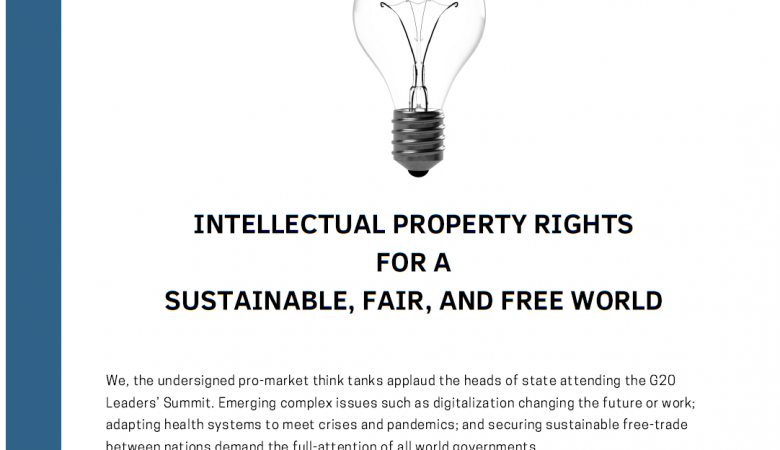PRESS RELEASE: International Group of Pro-Market Think Tanks Urges G20 to Protect Intellectual Property Rights
Washington, DC November 29, 2018
Contact: Lorenzo Montanari
e-mail: lmontanari@propertyrightsalliance.org
International Group of Pro-Market Think Tanks Urges G20 to Protect Intellectual Property Rights
A letter signed by 22 groups from 14 countries has one message for G20 leaders: the inequality of intellectual property protections cannot continue, G20 countries must affirm their commitment to protecting these essential human rights.
The letter comes on the heels of an increasingly bitter trade dispute between China and the United States that has at its origin weak enforcement of intellectual property rights (IPRs); which is sure to be a key issue when the leaders of both countries meet at the G20 Leaders’ Summit in Argentina.
The international group advises all G20 members to protect IPRs as a “people centered” policy with numerous follow-on effects such as stimulating economic growth, protecting human rights, and incentivizing innovation. Crucially, the letter warns inadequate IP protections, even among G20 members, is an inequality that must be tackled.
Only 13 percent of the world’s people live in countries with dependable protection of IPRs, according to the International Property Rights Index, and those countries are responsible for 60 percent of the world’s GDP. Their citizens enjoy a per capita income 20 times greater than those with the weakest property rights protections.
IPRs allow innovators and artists to own their work and control how it is used “forming the basis of a market system that helps release the inventive capacity of the world’s innovators,” the letter states.
However, “despite more than twenty years of the WTO TRIPS Agreement, to which all G20 countries are signatories, online piracy, and trade in counterfeit goods amounting to $461 billion, or 2.5 percent of global imports, continues to plague the world economy.”
The letter highlights the importance IP rights play especially in the health sector, for women in innovation, and for small businesses. Weak enforcement of IPRs can jeopardize R&D for life-saving medicines while countries with strong enforcement have more women inventors.
The letter concludes “IP rights are human rights; they drive economic growth; protect consumers from dangerous or substandard products; and allow individuals to contribute their own talents to solving the world’s most pressing issues. We therefore call upon G20 leaders to affirm their commitment to the protection of IPRs.”

